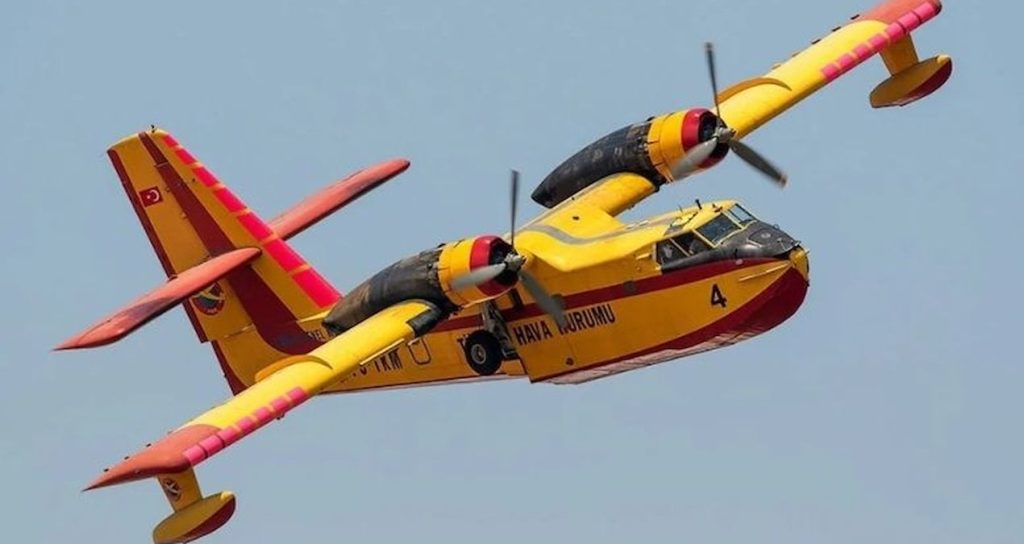Türkiye is currently grappling with a severe outbreak of forest fires that have engulfed several regions, including Izmir, Sakarya, and Balikesir. Amidst this environmental crisis, reports have emerged regarding the sale of firefighting aircraft belonging to the Turkish Aeronautical Association (THK), raising concerns about the nation’s preparedness to combat the ongoing fires. The aircraft, which were flagged for their lack of operational capacity, are reportedly being auctioned off, leading to widespread criticism and discourse regarding the management of firefighting resources in the country.
| Article Subheadings |
|---|
| 1) The Current Fire Crisis in Türkiye |
| 2) Controversial Sale of Firefighting Aircraft |
| 3) Minister’s Statements and Public Outcry |
| 4) Details of the Aircraft for Sale |
| 5) Implications for Future Firefighting |
The Current Fire Crisis in Türkiye
Türkiye is experiencing a devastating series of forest fires, particularly affecting key regions such as Izmir, Sakarya, Bilecik, and Balikesir. These fires have not only led to significant ecological destruction but also caused loss of life, sparking nationwide concern and urgency surrounding firefighting capabilities. Authorities have declared numerous areas as disaster zones while mobilizing local resources and volunteers to combat the flames, which have been intensified by hot, dry weather conditions. The scale and frequency of these wildfires have exceeded previous records, prompting questions about national preparedness for such environmental emergencies.
Controversial Sale of Firefighting Aircraft
Amidst the ongoing crisis, reports indicate that eight firefighting planes previously owned by the Turkish Aeronautical Association (THK) have been placed for sale. Auctioned on the UYAP platform, the aircraft are valued at approximately 1.45 billion Turkish Lira. This decision to sell off the aircraft, especially during a high-demand period for fire suppression resources, has raised eyebrows and ignited a firestorm of criticism. Analysts have raised concerns about the implications of this sale as the nation battles rampant forest fires, questioning the logic behind selling potentially vital firefighting assets when their capabilities are most needed.
Minister’s Statements and Public Outcry
The controversy intensified following statements made by the Minister of Agriculture and Forestry, who addressed the public’s concerns surrounding the sale and operational status of the THK aircraft. He was quoted as saying that “there is a problem with these aircraft” and emphasized their inability to fly effectively, suggesting they are more akin to scrap than functioning firefighting machines. His comments have not only fueled public outcry but have also led to widespread skepticism about the government’s handling of emergency resources. Many citizens and experts criticize the decision to sell these aircraft, arguing that it signals a lack of commitment to safeguarding the nation’s forests and wildlife.
Details of the Aircraft for Sale
The details surrounding the aircraft being auctioned reveal a concerning picture about their operational readiness. The planes, ranging from 1969 to 1989 in production years, have varying values based on their registration codes and historical significance. For instance, the aircraft with registration code TC-TKZ, produced in 1983, has a value of 6.42 million dollars, while the oldest, registered as TC-TKM, produced in 1969, is valued at approximately 1.9 million dollars. This range demonstrates not just the age of these vehicles but their outdated technology, arguably unsuitable for modern firefighting needs. The aged fleet raises questions around whether newer, more effective firefighting technologies should be prioritized instead of reselling these outdated models.
Implications for Future Firefighting
The implications of selling firefighting resources during a critical period are worrisome. With the current fires still ongoing, many experts argue that Türkiye is at a crucial juncture in deciding how to best utilize available resources for fire management. The sale of the THK aircraft raises questions about future preparedness for wildfires and environmental protection. It highlights a need for investment in more modern firefighting technology and a reevaluation of how resources are allocated for emergency preparedness. Insufficient aircraft and outdated technology could have severe repercussions, leading to increased devastation in the face of future wildfires.
| No. | Key Points |
|---|---|
| 1 | Several regions in Türkiye are experiencing significant forest fires. |
| 2 | The Turkish Aeronautical Association is auctioning off outdated firefighting aircraft amid the crisis. |
| 3 | The Minister of Agriculture and Forestry criticized the operational status of the planes. |
| 4 | The auction figures for the aircraft indicate their age and outdated technology. |
| 5 | Concerns arise over Türkiye’s future preparedness for wildfires. |
Summary
The ongoing forest fires in Türkiye underline a pressing environmental crisis exacerbated by governmental decisions regarding firefighting resources. The auction of outdated firefighting aircraft during a crucial firefighting period raises serious concerns regarding national preparedness and response capabilities. As the country navigates these challenges, attention must be given to securing more effective and modern firefighting equipment to ensure successful management of future wildfire incidents.
Frequently Asked Questions
Question: What caused the current forest fires in Türkiye?
The fires have been fueled by a combination of hot, dry weather conditions and a lack of adequate firefighting resources, exacerbated by logistical challenges in combating such widespread outbreaks.
Question: What is the significance of the THK aircraft auction?
The auction of the THK aircraft during an ongoing fire crisis highlights concerns regarding Türkiye’s commitment to environmental protection and disaster preparedness, especially given their outdated status.
Question: How can Türkiye improve its wildfire management efforts in the future?
To enhance wildfire management, Türkiye needs to invest in modern firefighting technology and increase resources allocated for emergency preparedness and response initiatives.


